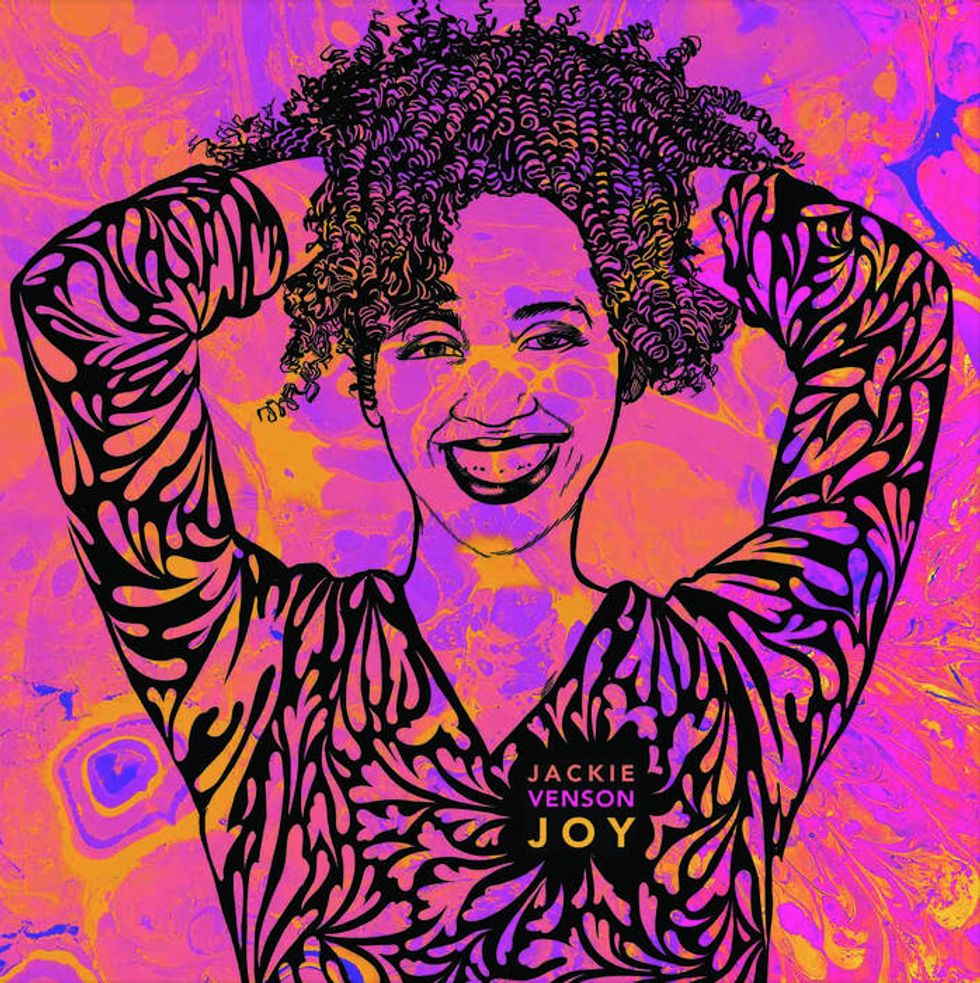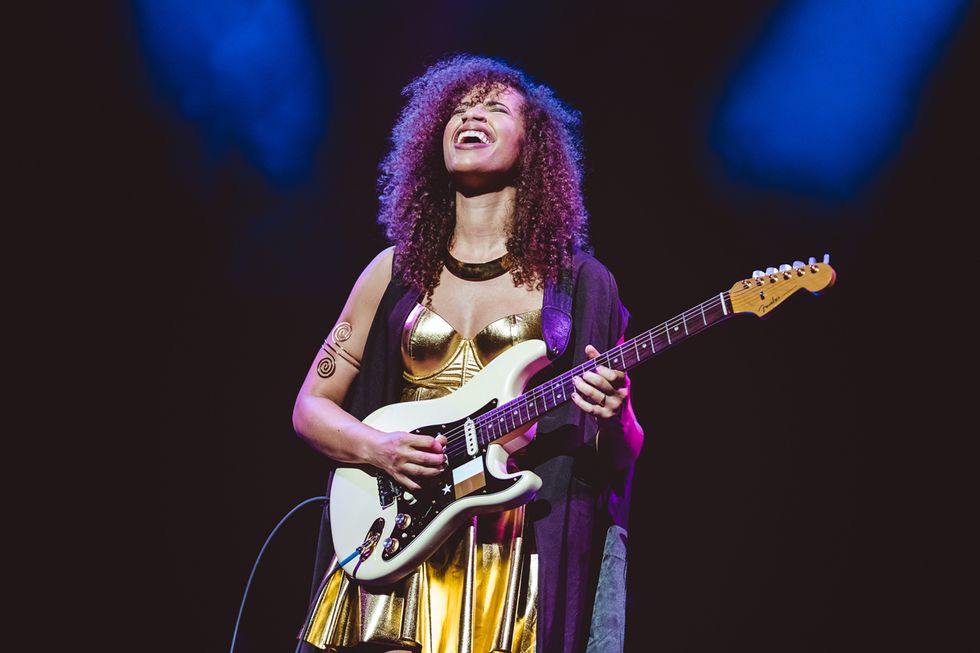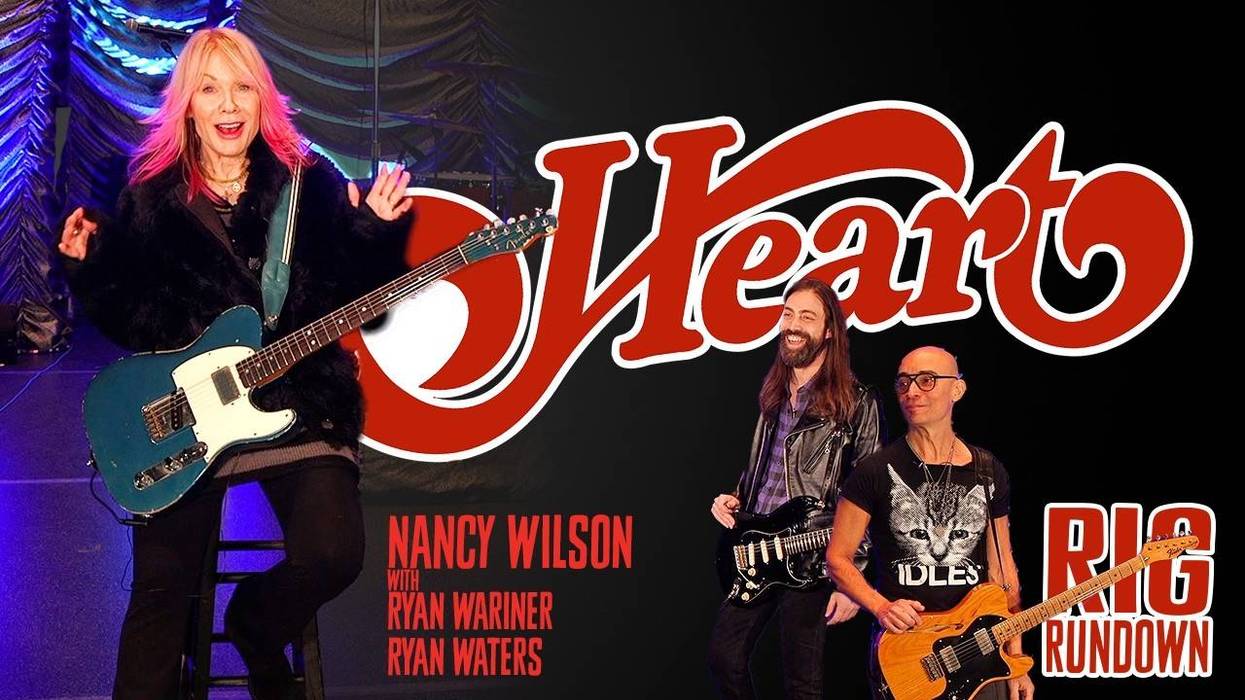Austin’s Jackie Venson fuses electric Hendrix-meets-Prince blues guitar and a panoply of synthesized voices and vibes, eagerly and fluidly passing through genres to never quite call one home. Genre-bending is à la mode today, but when orchestrated with her kind of finesse, it’s really the artist that becomes the genre. That’s even more impressive given that Venson, who is 29, only started playing guitar less than 10 years ago.
She was studying classical piano at Berklee College of Music in Boston when her passion for that instrument changed “literally overnight,” Venson says. “I was really sad and I was angry, like it was somebody else’s fault. And then I realized that it was just going to happen anyway. It just happened in a really hard way.” Three years into playing guitar, she released her debut studio album, 2014’s The Light in Me, but by then she was already blowing critics away with her snarling tone, fluid playing, and free-ranging ideas. Venson says those skills are simply a product of her lifelong devotion to her own musical education.
With her new album Joy, which was released on April 5 and follows a live album and an EP, Venson has set a new personal benchmark. Joy captures her evolved approach, modernizing the spirit of the blues while carving out its own hip-hop, R&B, and electro-pop-dappled space. She often matches her vocal line to the guitar—which is more common in jazz and stands out in Venson’s more rock-oriented context. Overall, her sound is as big and bold as her personality. In discussing the twists and turns of her life, she comments, “That’s the kind of person I am: If I don’t care about something, I will not do it. ’Cause I’m going to die one day, you know? I’m not going to do something I don’t care about.”
Her commitment to her music resonates throughout Joy, which boasts a prolific 20 tracks. She’s the lead singer, songwriter, and guitarist on the recording, and Venson played synth parts and co-produced. At an early spot on the album, she includes a conversation with one of her producers, where he says, “You’re in the studio aren’t you? It’s like you spend your whole life in there.” She agrees—and that’s not an understatement.
Joy was recorded over the past few years with four different producers and six engineers—as Venson found different artists who worked behind the board that she wanted to create music with. Read on to get a glimpse into her thoughts behind that process, hear about her guitar approach and influences, and become more familiar with her singular style and voice.
It was interesting to learn that you’re a classical pianist turned blues guitarist. How did that happen?
It’s pretty weird how you get started down a road and the road just leads you somewhere. I know it seems really obvious, but you really have no idea where it will lead you. Not even an inkling. I didn’t know that that school was going to lead me to a completely different instrument. And I learned, around age 25, that you have some control, and you have some say, but you just got to put your seatbelt on and let it happen and try not to get thrown off the train. Because if you want to control everything, then you probably shouldn’t start walking down that road in the first place.
So, I knew I had a loose interest in guitar because I grew up in Austin, and guitar’s everywhere in Austin. But I never really was interested in it because I played the piano and I loved the piano. But then I lost my passion for the piano at Berklee, while simultaneously maintaining my passion for music as a whole. I didn’t want to quit music. I just didn’t want to play the piano anymore. I figured the only natural solution would be to pick up a new instrument.
Joy is your second studio album. What inspired the title?
It was actually my manager’s idea. We were getting lunch one day and just talking about a show I’d done recently, about how my fans always tell me at shows that I exude happiness when I play. That’s when he was like, “Hey, you should call your next record Joy,” and as soon as he said that, ideas exploded in my head. I took it from there.
What was the production process like?
I collaborate with producers, but I’m very much a part of it. They’re never the only ones making decisions, and neither am I. We’re a team. And the new record sounds better than anything I’ve ever released because I stopped self-producing. All of the projects before this record were produced by me. I ran the whole session, and I just had an engineer. For this project, I had the studio and the engineer, but then I’d have a separate person producing: helping me with the arrangements, maybe coming up with a better line for that guitar solo than the one that I had. Just two heads are better than one kind of stuff. I don’t think anybody can do it themselves.

TIDBIT: Venson used a variety of producers and engineers on her new 20-song album, which was made over several years but sounds entirely consistent.
How do you go about finding the right producers to collaborate with?
Usually, the first thing that you do is listen to everything that they’ve done. If you like everything that they’ve done, you have to tell that anxiety-ridden control freak in your brain to shut up. Self-producing my stuff … it never really landed. And it’s a hard reality to accept, but the sooner you accept it, the sooner you can move on to making great music that’s timeless and is a meaningful addition to human culture. Right? And you just gotta be open to it and you gotta reference other music that’s timeless. Listen to all the music that’s been around forever—the music that you hear in grocery stores. And if somebody is out there who can take the music that’s really hot and then compare it to your music and say, “This music has this and your music has that, and if you want it to sound like this, you’re going to need this,” you just gotta trust and have faith.
Who did you work with on this project?
I used a few different producers. A couple of the producers on the record are just really great players who I heard some of their demos and I thought they were really great. Then one of the producers is also the mixing engineer, Tim Palmer, and I worked with him just for mixes—not production at all. I thought his ear was so great. He would add stuff in mixing. He would add shakers to this section but he wouldn’t say anything about it. He’d just slyly do it, and see if I noticed.
When you’re partnering with people for the creative process, what makes you feel like the song is yours?
I usually write the song. I write the chords, the lyrics, and the melody. And I come up with a loose idea of how I’d like it to sound, and then maybe I’ll throw together a demo of what I think it should be. Then that’s where the conversation with the producer starts. And sometimes the producer would be like, “Don’t you think this word would fit better than that word and still preserve the meaning of the sentence?” That’s my compromise. I’m open to better ideas, like “Instead of putting a guitar solo there, maybe we should put a bridge there.” But that means I have to go home and write the bridge, because I prefer to be the writer. However, in the future I can see myself being more open-minded with people. I just have to find somebody I’m compatible with. Because the writing process for me is really deeply personal. It’s how I meditate.
Although she loves blues and cites Buddy Guy, Derek Trucks, and Eric Gales as influences—and plays guitar with a tone and approach that’s in the genre’s camp—Venson has little patience for purists and is committed to working outside of any box. Photo by Ismael Quintanilla
Do you have specific goals that you strive for in your music?
Overall, I’d like to maybe remind people that learning how to play instruments, and also putting the time into mastering an instrument, is very valuable and we shouldn’t lose that. A lot of people don’t really do it anymore, because you can make music now without having to learn how to play an instrument. Which is cool. It’s expanded the soundscape significantly, which is rad. But I want to expand the soundscape while preserving all of the stuff that we’ve been doing as a species for, like, thousands of years. We still need to learn how to play instruments. It’s very important. And we also need to make new instruments. Like we still need to do this side of the music. Just because it’s a little bit easier to learn how to do something else and still be able to make music doesn’t mean that we should always take the easy route.
Are you afraid of that being lost?
I’m afraid of the standard being lowered. I’m afraid of people in a hundred years not being able to play as well as people a hundred years ago. If so few people do it that we really don’t have any true masters anymore, the bar just gets lower and lower, and then we don’t have any more Mozarts.
What is the songwriting process like for you?
Lately, I’ve been working with these drum machines and samplers. I’ll lay down some kind of beat, because I love music that’s driven by a beat. Some of my favorite styles of music are hip-hop and R&B, and the beat in hip-hop and R&B really drives the song. And so I used to start with chords and a melody and then put lyrics on it. That’s how I did it for years. But now I’ve been starting with a beat. And that’s been really fun. It’s been a really great time and I’m still really stoked about it. I’m going to write a whole record that’s just all about the beat.
Who are your favorite hip-hop and R&B artists?
I really love Lauryn Hill, old R&B like Donny Hathaway, Kendrick Lamar, J. Cole. I’m super in love with Notorious B.I.G. I really love some of the early Kanye records.
Any specific records?
College Dropout. Homecoming was so good. I still listen to that record. I can’t let it go. I love it so much. I really love [Lamar’s] Good Kid, M.A.A.D. City. I also like Section.80. And then Lauryn Hill’s Miseducation is absolutely the gospel, as far as I’m concerned, for ’90s hip-hop. I really love the Fugees—pretty much everything they did, especially “Ready or Not.” I also really love the Roots, George Clinton, and the stuff in the ’80s that Stevie Wonder did. He could be classified as R&B, if you want, but honestly I don’t think he has a genre. In my early days, I was pretty obsessed with Alanis Morissette. I love all of her music. She’s an amazing singer, and she’s got a really distinct style where she, like, flutters her voice. She always knows exactly when to do it. I used to listen to her obsessively when I was in high school. There were years where she was the only one I listened to.
Who are your guitar influences?
A big one is Buddy Guy. Another is Jeff Beck. I also used to listen to a lot of Derek Trucks when I was just learning how to play. I was trying to listen to people to see what I could learn about everything that the instrument was capable of when it came to tone. Like, how far do I bend the strings? That kind of stuff. Get all the information you can get from listening to other people play. So I listened to a lot of Jeff Beck, a lot of Buddy Guy, a lot of Black Keys—their rhythm parts are really groovy. Lately I’ve been listening to Eric Gales, ’cause he’s just the best guitar player in the world. Trying to steal some of his licks … you know how it is [laughs]. When he shreds, it’s like Eddie Van Halen meets George Benson meets Yngwie Malmsteen, and then add 10 to the BPM and that’s him. But a musician’s work isn’t all in how much they can shred, honestly. If he just wants to break your heart with a melody, he can do that too. He’s so tasteful. Eric Gales knows how to do both and can also do both better than everybody. [Laughs.]
What’s your main guitar?
A Fender Stratocaster Elite. It’s the only guitar I play if I have any control over it.

Guitars
Fender American Elite Stratocaster
Amps
Kemper Profiler
Effects
Eventide H3000 Ultra-Harmonizer
Electro-Harmonix SYNTH9
Strings and Picks
Ernie Ball Paradigm (.010–.046)
Various picks
Why do you love it?
I’m used to it, but also I acquired it in a really special way. I felt like it almost spoke to me in the store, and I feel it still does speak to me. It has songs in it. Every time I start playing it, within, like, three minutes I’m already playing something. I don’t know where the songs come from, so the only thing I can deduce from it is that there’s songs in that guitar.
Is there any other gear you use that you feel passionately about?
I use a Kemper profiling amp. It’s the greatest thing ever. It allows me to have access to 15 different amps and pedal rigs all in one little box. And because it’s a profiling amp, it’s not working with amp samples. It’s working with amp algorithms. If you were to blindfold somebody, they wouldn’t be able to tell the difference between a Fender Blues Junior and a Kemper profile of a Fender Blues Junior. I guarantee it.And it also profiles effects pedals. I have vocal wah, Vox wah, vowel wah, phaser wah—where like this blues wah pedal will switch on and off phase. It’s crazy. It sounds like a spaceship taking off. And I have a classic Cry Baby wah. So I don’t have to have a pedalboard anymore. I don’t have to have an amp anymore. All I need is this little poster-sized Kemper, and it comes with a foot controller.
I plug an expression pedal in, to sometimes control the feedback of the delay. You can tell the expression pedal to do a ton of different things. You can use it to turn up the gain on a distortion pedal. You can use it as a volume pedal. And [the Kemper] has three or four different inputs for expression pedals, so it just depends on how many you want to buy. I’ve been doing really freaky shit with that Kemper, man. It’s awesome. It’s like the greatest thing that’s ever happened to me.
On the last track of the album, “When It’s Right,” there’s a really cool guitar and synthesizer transition. How did you do that?
That song was recorded live in the studio, with seven of us in a room. I played the piano for the first entire half of the song, all the way through to the horn breakdown section where they play the whole melody together. Then there’s that synthesizer being held, right? And I have a little [Novation] MiniNova [synthesizer], and I turn on the latch button, and I hold these chords out and do a filter effect, and then I finally bring it down and then I fade it out. And the keyboard player, who’s been playing the organ the entire time, starts playing the acoustic piano part while I put the guitar on my body and start playing the guitar. And then from there, through the remainder of the song, I play the guitar.
What’s your favorite track on the album?
I would say “Afterglow.” It’s poppy and weird and I love it. It’s like my middle finger to all the people who call me a blues band. It’s like, “Hey check out this blues artist.” [Laughs.] Have fun calling me a blues artist after this one. I know that there’s blues on the record. That’s because there’s blues in everything. There’s blues in hip-hop. Blues is the source of all modern music. I’m not a blues artist. I’m just an artist. I’m an American music artist. I make American music. I basically play all of the styles that have been influenced by blues, that I’m capable of writing. That’s what I do.
Jackie Venson’s live solo performance of “I Will Find a Way,” a song from her new album, Joy, displays her unique blend of raw blues-influenced guitar shredding with electronic beats—an approach that allows her to handily incorporate hip-hop and R&B elements into her sound.



















![Rig Rundown: Russian Circles’ Mike Sullivan [2025]](https://www.premierguitar.com/media-library/youtube.jpg?id=62303631&width=1245&height=700&quality=70&coordinates=0%2C0%2C0%2C0)
















![Rig Rundown: AFI [2025]](https://www.premierguitar.com/media-library/youtube.jpg?id=62064741&width=1245&height=700&quality=70&coordinates=0%2C0%2C0%2C0)











